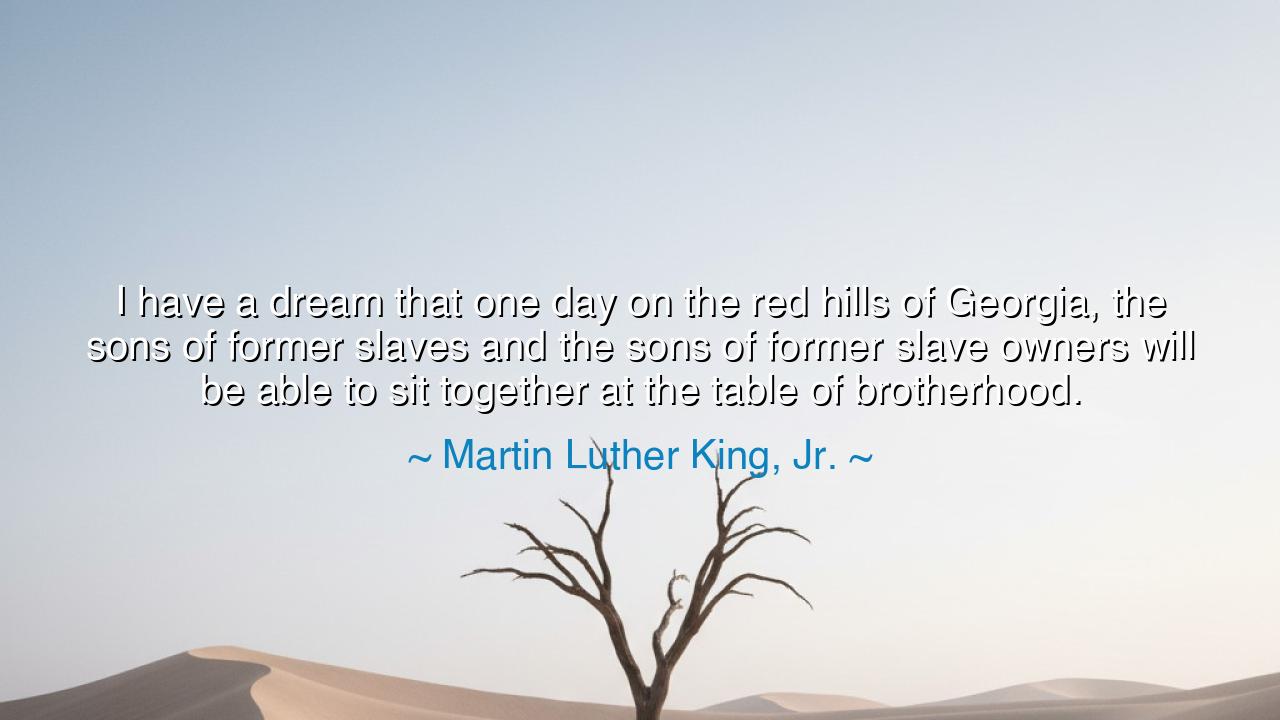
I have a dream that one day on the red hills of Georgia, the sons
I have a dream that one day on the red hills of Georgia, the sons of former slaves and the sons of former slave owners will be able to sit together at the table of brotherhood.






The reverend and prophet of justice, Martin Luther King, Jr., lifted his voice before the multitude in Washington, D.C., and spoke words that shook the conscience of a nation: “I have a dream that one day on the red hills of Georgia, the sons of former slaves and the sons of former slave owners will be able to sit together at the table of brotherhood.” In this vision, King summoned not only the memory of centuries of bondage but also the hope of reconciliation, that the chains of history might be broken, not by vengeance, but by brotherhood. It was a dream both radical and deeply human: that those once divided by cruelty and oppression could meet as equals and as kin.
To speak of the red hills of Georgia was to call forth the very soil soaked with the sweat of enslaved laborers, land that bore the scars of human bondage. Georgia, and the South as a whole, was the stage where the sin of slavery had played its cruelest act. Yet King dared to imagine that upon those very hills, where division had been sown, unity could one day flourish. The image of sons—not fathers—was deliberate. For King knew that the future belonged not to the old order, but to a generation yet to come, one that could inherit a new legacy if the chains of hatred were cast aside.
The table of brotherhood is a symbol as ancient as scripture. A table is the place of fellowship, of shared bread, of equality, for all who sit at it are nourished together. To bring together the descendants of both the oppressed and the oppressors at one table was to imagine a reconciliation greater than politics, greater than law—a reconciliation of the heart. It was not a dream of ignoring history, but of transcending it, of transforming sorrow into solidarity.
History shows us glimpses of this dream in action. Consider the story of Nelson Mandela in South Africa. After decades of imprisonment under apartheid, he emerged not with a cry for revenge, but with a hand extended to his former jailers. He built a nation where black and white could sit together, where truth was spoken, and forgiveness sought. Like King, Mandela understood that lasting freedom is not built on retaliation, but on reconciliation. The world saw in him a living echo of King’s dream: enemies becoming brothers, tables once divided now joined.
But King’s dream was not naive. He knew the struggle would be long, that hatred and prejudice would not vanish with a speech. His words were not an escape from reality but a call to action. The dream was a compass pointing toward the promised land, even when the journey was hard. To sit together at the table meant dismantling unjust laws, challenging violence with nonviolence, and demanding that America live up to the creed that all men are created equal.
The deeper meaning of this vision is that reconciliation is the highest form of justice. It does not erase wrongs, but it redeems them. It does not pretend that chains never bound, but it insists that chains need not define the future. By invoking sons of slaves and sons of slave owners, King declared that identity need not be trapped by ancestry, that even those who inherited the sins of history could choose a new way—the way of brotherhood.
The lesson for us is clear and urgent. We must labor to build tables where all can sit—tables of community, of justice, of shared humanity. We must teach our children not to inherit the hatred of their fathers, but to sow compassion in its place. We must look upon our neighbor not as stranger or enemy, but as brother or sister, bound to us by the same breath of life.
Practical wisdom flows from this: seek reconciliation in your own life. Where there is division, sow peace. Where there is prejudice, speak truth. Where there is enmity, build fellowship. For King’s dream is not a relic of history; it is a task still unfinished. Only when we sit together, not as masters and slaves, not as victors and vanquished, but as brothers, will his vision be fulfilled.
Thus let the words of Martin Luther King, Jr. endure as both prophecy and command: the dream is not only to be spoken, but to be lived. And when it is lived, the red hills of Georgia—and every hill across the world—will echo with the song of freedom and the peace of true brotherhood.






AAdministratorAdministrator
Welcome, honored guests. Please leave a comment, we will respond soon